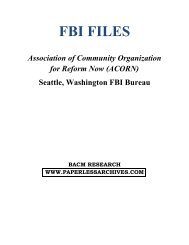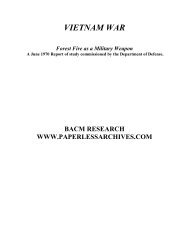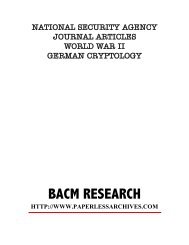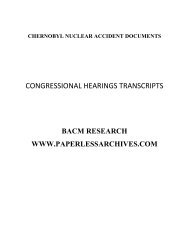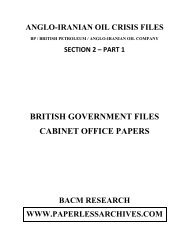Chernobyl Nuclear Power Plant CIA Files - Paperless Archives
Chernobyl Nuclear Power Plant CIA Files - Paperless Archives
Chernobyl Nuclear Power Plant CIA Files - Paperless Archives
You also want an ePaper? Increase the reach of your titles
YUMPU automatically turns print PDFs into web optimized ePapers that Google loves.
.-Seeret -<br />
Criticism of official suppression of open discussion on<br />
<strong>Chernobyl</strong>' was voiced at the April All-Union Writer's<br />
Plenum by the Ukrainian poet Boris Oleynik. In<br />
his speeCh, he expressed his frustration with the<br />
central press, saying he has been denied access to the<br />
media to publish his reservations about the completion<br />
of units 5 and 6 at <strong>Chernobyl</strong>'. He told Uteraturnaya<br />
gazeta he repeatedly tried to speak out but was not<br />
permitted to do so. Another prominent Soviet literary<br />
figure, Yevgeniy Yevtushenko, told /zvestlya there<br />
were attempts by unspecified ministries and departments<br />
to suppress the production of the <strong>Chernobyl</strong>'<br />
documentary, "Kolokol <strong>Chernobyl</strong>'ya," because the<br />
film was critical of nuclear technocrats.<br />
<strong>Nuclear</strong> Energy Policy<br />
V r~i! : popular support for nuclear power in the Ws:st<br />
L.:.lI h,~,. o:roded further by the <strong>Chernobyl</strong>' disaster,<br />
Moscow's formally stated nuclear energy goals remain<br />
unchanged, despite signs of public anxiety.<br />
However, it is attempting to be responsive on the<br />
safety issue, creating an internal tension in regime<br />
policy.' .<br />
The nuclear energy bureaucrats remain firm in their<br />
determination to rely more heavily on nuclear power.<br />
Minister of ,(\tomic Energy Nikolay Lukonin announced<br />
in April 1987 that Moscow's. plans to double<br />
electricity output at nuclear power stations by 1990,<br />
as compared with the 1985 level, and more than treble<br />
it by 1995 remain unshaken. According to Andronik<br />
Petros'yants, the recently retired head of the State<br />
Committee for Utilization of Atomic Energy, after<br />
the RBMKs already under construction are completed,<br />
the iraphite-moderated reactor will be phased out<br />
in the Soviet Union, and future construction of nuclear<br />
plants will be based on water-cooled,water-inoderated<br />
reactors. This change has not gone far enough to<br />
satisfy those among the Soviet environmentalists who<br />
demanded the closing of all <strong>Chernobyl</strong>'-type reactors,<br />
but energy needs and high cost apparently rule out<br />
this option.<br />
The regime has meanwhile publicized new measures<br />
to ensure reactor safety, including a new decree on<br />
nuclear safety by the USSR Council of Ministers in<br />
July. In the same month, the Politburo passed a<br />
resolution for the development of automated systems<br />
at nuclear power stations. What impact on safety<br />
these changes will have is not yet clear. The new<br />
decree designed to strengthen safety inspection regulations<br />
for the State Committee for Safety in the<br />
Atomic Energy Industry focuses primarily on new<br />
nuclear power stations. And more rigorous operator<br />
training and a few hardware modifications proposed<br />
by the Ministry of Atomic Energy will do little to<br />
improve the existing RBMKs reactors and the earlier<br />
pressurized water reactors (VVERs), which have significant<br />
safety problems. Decommissioning or extended<br />
shutdowns of these reactors may be the only safe<br />
solution, but not one that the Safety Committee is<br />
now capable of executing.<br />
Since the accident, the nuclear energy industry has<br />
undergone an extensive reorganization designed,<br />
among other things, to make it more responsive to the<br />
public concerns of safety. The reference at the <strong>Chernobyl</strong>'<br />
trial to the secrecy of nuclear engineering is an<br />
implicit criticism of the industry's wholly technocratic<br />
approach, which had traditionally given little weight .... . J<br />
to social concerns. There is also renewed discussion on<br />
the siting of future nuclear plants in more remote<br />
areas, stressing ecology as a major consideration.<br />
However, it is too early to judge ~hat actual changes<br />
these measures will bring. ' .. f<br />
Another <strong>Nuclear</strong> Accident?<br />
Western analysts agree that the RBMK reactorsnearly<br />
half of the Soviet nuclear power capacityhave<br />
fundamental deficiencies that no reasonable<br />
modification can eliminate and pose a continued<br />
safety hazard, remaining vulnerable to severe accidents."<br />
The Soviet Union now has more experi~nce<br />
and is better prepared to deal with a f!uclear power<br />
plant accident than any other country in the world.<br />
Still, another nuclear catastrophe would deliver a<br />
serious blow to Soviet nuclear policy and could produce<br />
high-level political shakeup-including in the<br />
Central Commi~tee and ministries responsible for<br />
" Althoullh a serious accident in another <strong>Chernobyl</strong>··type reactor<br />
would pose considerable social and political repercussions for the<br />
Soviets and could mean the end o( RBMKs. a m~or accident in a<br />
VVER reactor would have far graver implications (or Soviet<br />
confidence in nuclear reactor design because the water·moderated<br />
reactor is slated to be the workhorse o( the 1990s. while the RBMK<br />
was being phased out even before Chernobyr .<br />
30<br />
I





